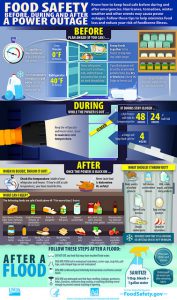By: Kendra Zamojski and Laurie Osgood
If you lost power or your home was damaged by flooding, the food or water in your home could make you and your family sick.
Fridge and Freezer Food Safety
After only a few hours without electricity, refrigerated or frozen foods can reach a temperature that can make your food unsafe to eat. Cooking foods stored at unsafe temperatures does not make them safe to eat. Water damage can also contaminate food and water, making it unsafe to consume.
Boil Water Advisories

If you’re under a boil water advisory or your private well was damaged, all water for drinking, handwashing, washing fruits and vegetables, dishwashing or cooking must be boiled or otherwise sanitized before use. Bottled water may be used until the advisory is lifted or you have your well water tested for bacteria.
Bring water to a boil and keep it at a rolling boil for at least one minute before use. If boiling isn’t possible, disinfect water by adding 1/8th teaspoon (or about eight drops) of unscented household bleach per gallon of water. Stir well and let stand for 30 minutes. If the water is still cloudy, repeat the chemical procedure once or boil water for 3-5 minutes longer. Follow health department boil water guidelines as a longer boil time may be required to kill pathogens. Boiling water is the most effective method to be sure water is safe.
Cooking Without Power
During a power outage, you can heat or cook food on a grill, camping stove, fireplace, or campfire. If you are using a generator to supply electricity or cooking with grills and camp stoves, they should be used outdoors and kept a safe distance away from your home or shelter. Do not attempt to use this equipment indoors, this will release potentially lethal carbon monoxide into your home. When using a fireplace or campfire, never use treated wood, as chemicals can transfer into your food. If you use a fireplace to cook, make sure the flue is open and completely unobstructed.
If you lost power, or your home was damaged by water, it’s better to be safe than sorry. If in doubt, throw it out. Always follow normal food and water safety practices to prevent foodborne illness.
For more disaster recovery tips, go to disaster.ifas.ufl.edu.
Source: Safe Handling of Food and Water in a Hurricane and Related Disaster https://edis.ifas.ufl.edu/fs131
 0
0
